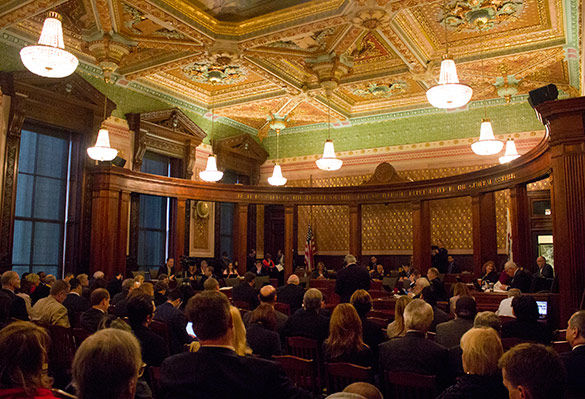Comptroller says Illinois lawmakers will have to get in a long line to get paid

April 17, 2016
Election-seeking Illinois Comptroller Leslie Geissler Munger plans to delay monthly paychecks for lawmakers and statewide officials, saying there isn’t enough money to pay the state’s bills and other services should go to the front of the line.
The comptroller’s office will still process the paychecks, estimated at $1.3 million a month, but lawmakers won’t get the money right away because the payments “will then wait in a queue with other payments before being released when cash is available.”
Munger, a Lincolnshire Republican, will discuss the decision during a rare Sunday morning news conference in Chicago. Her office argues that lawmakers’ paychecks should be treated like all other bills.
Advertisement
Currently, there is a delay of at least two months on most bills. Universities haven’t gotten state money since July, as Republican Gov. Bruce Rauner and Democrats led by House Speaker Michael Madigan and Senate President John Cullerton remain deadlocked on a state spending plan.
“Our social service network is being dismantled, mass layoffs are occurring and small businesses across Illinois are awaiting payments for services they’ve already provided,” Munger said in a statement. “As our cash crunch grows in the coming months, it is only appropriate that the unfair prioritization of payments to elected leaders ends. We are all in this together, we all will wait in line.”
But Munger also acknowledged the political effect of delaying pay for lawmakers, saying it may force a resolution sooner rather than later.
“It is the right thing to do,” Munger said. “And if this action helps bring all sides together to pass a balanced budget and end this unnecessary and devastating hardship to our state, that is an added benefit.”
The money is a drop in the bucket, but the move is shrewd politics.
Munger, appointed by Rauner after the December 2014 death of Comptroller Judy Baar Topinka, faces a special election in November against Democrat Susana Mendoza, the Chicago city clerk. Neither candidate is well known statewide, and the contest is low-profile in a presidential election year.
Munger’s decision on lawmakers’ paychecks gets her name out there in a populist way.
Advertisement*
It’s not the first time legislators have seen their pay targeted amid political gridlock, and the move will undoubtedly bring up legal questions about the separation of executive and legislative powers.
In July 2013, Democratic Gov. Pat Quinn used his veto powers to eliminate lawmakers’ pay from the state’s annual spending plan to try to force action on a plan to overhaul the state’s employee pension plan. Democratic legislative leaders sued, and lawmakers went two months without salary before a judge ruled the move was unconstitutional and the comptroller eventually had to cut the checks.
The 177 legislators receive a base salary of $67,836, but most earn thousands more in stipends by serving in Democratic or Republican leadership positions, or acting as chairman or vice chairman of legislative committees.
Serving in the House or Senate is a part-time job, with lawmakers typically scheduled a few days a week from January through May, and again in the fall.
For some legislators, the state salary is their primary or only source of income, which means not getting paid is a financial hardship that turns up the pressure to get a budget resolution. Other lawmakers, including many of the legislative leaders, have lucrative law practices, other jobs or financially successful spouses.
___
(c)2016 the Chicago Tribune
Visit the Chicago Tribune at www.chicagotribune.com
Distributed by Tribune Content Agency, LLC.
Advertisement







